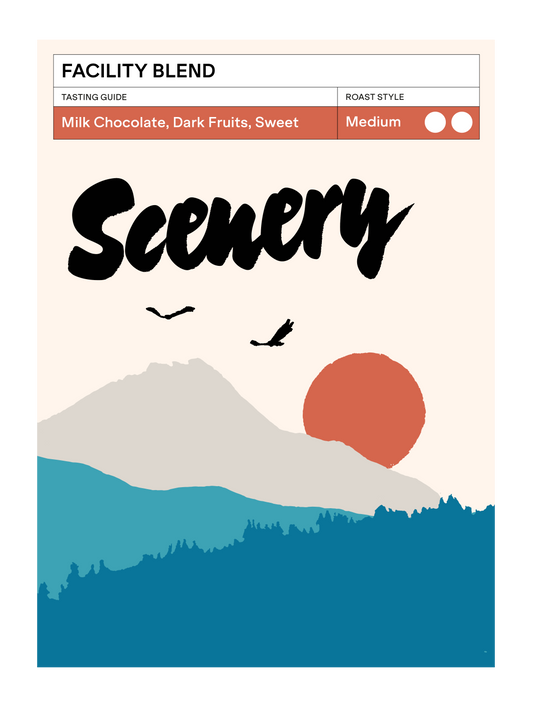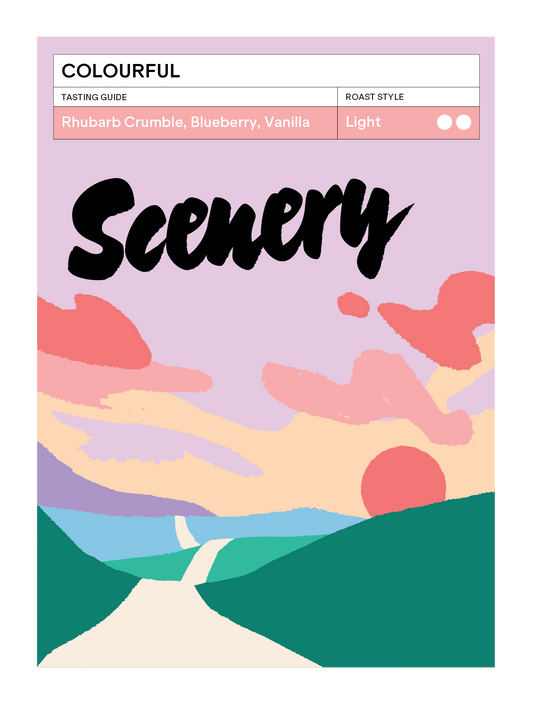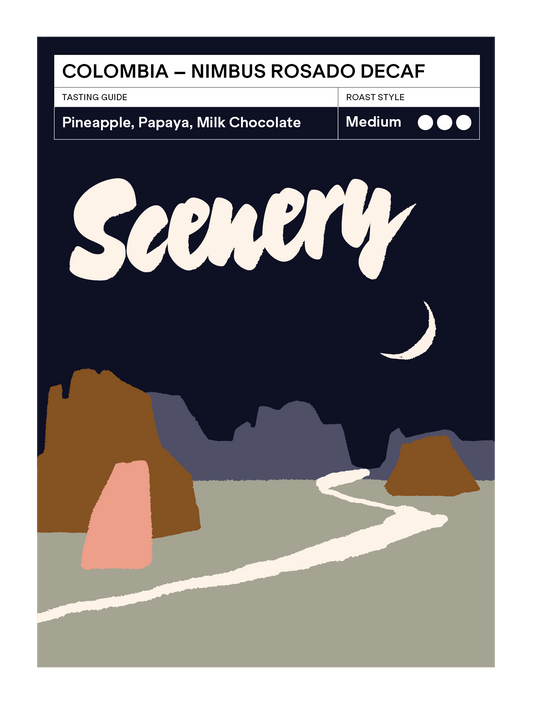Finca Miramar Espresso ran from from 10/04/24 to 08/05/2024.
We’ve picked up a short run of this jammy El Salvadoran coffee to run as espresso - while El Salvador is in harvest now, a coffee like this is in the perfect time to run as a more developed profile.
This lot was grown at Finca Miramar but processed at the famous Beneficio Las Cruces, a wet mill that has produced some coffees we’ve absolutely loved in our coffee careers. The processing on this anaerobic washed lot lends itself well to a touch more time in the roaster to emphasise body and sweetness, without excessive funk.
Brew Guide:
Best Brewed: Espresso, Moka Pot, Immersion (French Press/Aeropress)
We’re roasting this delightfully syrupy and sweet El Salvadoran coffee with espresso in mind - looking to enhance the natural character of the coffee into a balanced espresso via a heavier hand with the roaster influence. Will work great in an aeropress or french press too!
Best Rested: 2 weeks
For Espresso: 18g in, 38g out, 26-30s
For Filter: 65g/L, 88-92c Water, Gentler brewing styles
We’re tasting:
Jammy bodied and thick - a dominant note of mango puree and strawberry jam, with milk chocolate and the spiced note of ground walnut in the finish. The aromatics are lead by a slightly boozy process character that reminds us of fruity high ester rum and toasted almond. As it cools, the berry note becomes more akin to blueberry compote and a warming note of clove.
In milk: Strawberry Marshmallow and butterscotch
Traceability:
Country of Origin: |
El Salvador |
Region: |
Los Naranjos, Apaneca-Ilamatepec |
Farm: |
Lot grown at Finca Miramar, processed at Beneficio Las Cruces |
Producer: |
Dr. Mauricio Sauerbrey y Familia |
Variety: |
Bourbon |
Elevation: |
1400 - 1650 MASL |
Process: |
Anaerobic Washed: Cherries hand picked and sorted at Finca Miramar, cherries then transported to Beneficio Las Cruces for further processing. Post ferment, the cherries are depulped through an ecopulper with mechanical demucilagination (scrubbing the parchment clean), with a final 10 hour fresh water soak. Patio dried over 21 days to a final moisture content of 10% |
Import Partner: |
Nordic Approach |
Harvest: |
2023 - Arrived UK: August 23 |
The Story
We’re big fans of the profile you find in coffees from El Salvador. The country has volcanic mountain ranges with rich soil, and sitting south-east of Guatemala it also benefits from the moisture and cooler air coming off its southern pacific coastline.
El Salvadoran coffee tends to produce lots with a milk chocolate and red fruit profile, but where it really comes into its own is dry process coffees like naturals & honeys.
The climate tends to be drier with a good amount of hot sunny days, which lends itself well to the long slow drying process required for dry process coffees. El Salvador has a few larger and well known farms that have made a name for themselves with quality - we featured one such farm (Finca Los Pirineos) as a component of Facility blend with our opening offer.
One operation that is well established and well known is the Salaverría family “JASAL” operation - a combination of farms and wet mills in operation for over 100 years. We’ve worked with many coffees grown and processed by the Salaverría family in our careers as baristas, and deeply respect the work that they do.
This coffee was grown on the Saurbrey family farm, Finca Miramar. Located on the slopes of the Santa Ana volcano, the soil is rich with nutrients thanks to the volcanic activity replenishing the soil - with the last eruption as recent as 2005. The farm name (Miramar = "Ocean view") references both the ocean breeze that comes off the pacific coast, bringing cooler air and moisture that helps delay cherry maturation and increase quality; as well as the fact that from the very highest elevations of the farm you can see the pacific ocean.
The farm sits between 1400 and 1650 MASL and grows the classic El Salvadorian varieties of Bourbon, Pacas, and “Bourbon Elite” (old growth landrace bourbon). The farm has heavy forest cover, as a result the majority of the coffee is shade grown. The forests on the farm are principally composed Peach, Macadamia, Pepeto de Rio, and Pepeto Peludo shade trees ensuring the coffee trees do not become sun-stressed. The cooler temperatures thanks to the ocean breeze and the shade allowing the coffee tree to focus nutrients in the seeds with slower maturation times, a key factor in quality coffee production.
The coffee cherries for this lot were picked and pre-sorted at Finca Miramar, before being driven via truck the short distance to the JASAL wet-mill “Beneficio Las Cruces”. The Sauerbrey family takes all of their coffee for processing at the Beneficio - the mill is well resourced, quality focused and technically adapt for both modern preps (extended fermentation, anaerobics and the like) as well as the classics, with a particular focus on honey and natural drying. Talking to Mathias Sauerbrey, who emigrated to Canada to work in the coffee import trade, we've come to learn that in the last two years the Salaverría's have begun the process to purchase Miramar and add it to the excellent roster of farms in the JASAL estate.
When we select a coffee specifically for espresso and a heavier hand with the roaster influence, we’re looking for a profile that lends itself to that style. Brewing a coffee as a classic style shot (under a 1:2.5 ratio and over 25s with 9 bar pressure) will amplify all the attributes we find on the cupping table.
If a coffee presents a bright sparkly acidity - brewing as espresso might turn that into a screaming unbalanced lemon-juice acidity, whereas something a little more restrained and balanced on the table will, when pulled as a shot, present as bright, juicy and moreish. So the trick is to look for something that has all the right flavour and aromatic elements, not too bright, and with that naturally heavier body and weight that will translate well to the syrupy texture we enjoy in a classic ‘spro.
We tend to favour more process-lead coffees for this very reason - while they often have high intensity flavour characteristics, sometimes the heavier process flavours can also go hand in hand with a slightly dulled acidity. This coffee from Finca Miramar is a prime example - presenting jammy fruit character without sharp or zippy acidity, and texturally very heavy on the cupping table - it’s the prime example of a coffee that will present as a delightful espresso with a little cajoling in the roaster to ensure solubility.

![[15] El Salvador - Finca Miramar [CROP 23/24 ARCHIVE]](http://scenery.coffee/cdn/shop/articles/el_salvador_finca_miramar_shopify_1.png?v=1715929867&width=1100)




![Mexico - Electrónicas Mazateca [25/26]](http://scenery.coffee/cdn/shop/files/mexico_electronicas_2526_shopify.png?v=1767970714&width=533)



![Colombia - Quebraditas Sidra Thermal Shock Washed [25/26]](http://scenery.coffee/cdn/shop/files/colombia_quebraditas_sidra_2526_shopify.png?v=1765544630&width=533)


![Colombia - Luz Ángela's Chiroso [25/26]](http://scenery.coffee/cdn/shop/files/colombia_luz_angela_chiroso_2526_shopify.png?v=1764359755&width=533)
